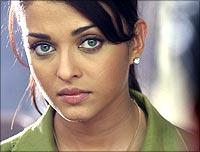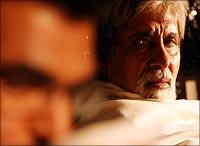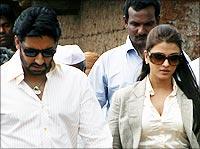Perhaps, because the real-life political supremo Ram Gopal Varma's Subhash Nagre is loosely based on used to be a cartoonist, the director chose to do away with character sketches completely in Sarkar Raj and work exclusively with broadly stroked outlines instead.
Also Read: Showcasing Sarkar Raj
Unfortunately, replacing character sketches with extreme, extreme close ups doesn't work all the time, and this film, for the most part, falls very flat, a well-lit and overdone follow-up to an overrated original. The acting is fine, but this is eventually a film without enough meat to sustain itself through to the end, culminating in an inevitably stifled whimper.
Right from the first scene -- starting as an uptempo throwback to the great barb-wire opening minutes of the original -- the mood is set. There is a dark room, sickeningly yellow beams of light filtering onto the characters artfully, almost bathing the ever-scowling characters in sepiatone, and all the frames are weirdly angular, shots composed around coffee mugs and ring-fingers and half a character's ear. The whole film seems like a disparate series of finely composed frames, as if Ram Gopal Varma inadvertently videotaped his attempts at photographing a Sarkar-themed calendar for the Bachchan family.
 Oh, and the characters don't talk in this film. Never. They deliver dialogues. Big and unwieldy lines, laced with strange metaphors that the characters can't do without. It's all threats and explanations of threats, and this kills this film, this long and unnatural sea of unashamedly expository dialogue, with literally just a line or two of quirky Ramu relief to be found in the whole film.
Oh, and the characters don't talk in this film. Never. They deliver dialogues. Big and unwieldy lines, laced with strange metaphors that the characters can't do without. It's all threats and explanations of threats, and this kills this film, this long and unnatural sea of unashamedly expository dialogue, with literally just a line or two of quirky Ramu relief to be found in the whole film.
And hey, I get the point. This is a masala bang-bang shoot-em-up mafia movie, and one can't possibly overestimate the importance of high-drama moments like the one described above. Characters need to occasionally step into the unreal, become way larger than life, and play cardboard cutouts well enough to enthrall audiences. Fair enough, and I agree completely.
Yet if every single scene of a film drips with high drama, the impact is lost. Whatever flaws the first Sarkar had, one couldn't deny the characters their impact, especially the leading man. This one, in its attempt to stay on a constant high -- just like its obscenely bad, sitar-abusing background score -- is resultantly left without any scenes played normally, in the key of the relatable, and so we're never in a position to actually buy into the drama.
The premise itself is doubtlessly interesting. Opening a mega power plant in Maharashtra could hugely benefit the people, but its very setting up requires the displacement of over 40,000 villagers. It is a believable conflict, that of the MNC splitting up political musclemen father and son over this issue. Both Sarkar (Amitabh Bachchan) and son Shankar (Abhishek) take the opportunity to give pro-Maharashtra speeches calculated toward the applause from the MNS audiences, in different directions. Sarkar wants the villages protected, Shankar is looking towards the long run. And so begins a conflict.
 Surely an idea with potential, but suddenly -- just as Shankar's campaign to rally around villagers gathers steam and he begins sharing how-I-killed-my-brother confidences with inexplicably inquisitive businesswoman Anita Rajan (Aishwarya Rai) while a local leader called Sanjay Somji (Rajesh Shringapure) clad in Raj Thackeray spectacles begins to turn a ridiculously fickle junta against him -- that whole conflict is mooted as we return to Mumbai and everyone, literally everyone, starts shooting at one another.
Surely an idea with potential, but suddenly -- just as Shankar's campaign to rally around villagers gathers steam and he begins sharing how-I-killed-my-brother confidences with inexplicably inquisitive businesswoman Anita Rajan (Aishwarya Rai) while a local leader called Sanjay Somji (Rajesh Shringapure) clad in Raj Thackeray spectacles begins to turn a ridiculously fickle junta against him -- that whole conflict is mooted as we return to Mumbai and everyone, literally everyone, starts shooting at one another.
Soon it's a bloodbath, but a completely unengaging and thanda battle, where corpses and kidnappings come too easy and the lines remain persistently cheesy. There is, as said, the odd moment of quirky humour, like when Chander (Ravi Kale) proudly points out land he owns to the boss's son Shankar, or when a frantic phone conversation abruptly ends with the words 'You too,' a jibe at that 'take care' we bandy about ubiquitously these days. Priceless moments, but are found here as rare as rationality.
The rest of the time we have to make do with ludicrous plot devices like a mute, gloved killer, straight out of a B-grade horror movie.
The acting is solid, and, as is the norm, Ramu surrounds his principal actors with a fine supporting cast. Kale and Govind Namdeo do very well, Shringapure is effective, Sayaji Shinde and Victor Banerjee are tragically underused, while Tanisha isn't half bad with clothes on.
 Aishwarya Rai, for all the talk of being redefined as an actress, doesn't have anything to do really, besides saying a line about a power plant survey in English and then, teary eyed, listening to men talk. Abhishek Bachchan continues to simmer, and while he does pick up a shovel and do his own dirty spadework, the character never quite comes to the boil. His job profile here is frowning sans emotion, be it at a sarcastic old politician or the death of his wife.
Aishwarya Rai, for all the talk of being redefined as an actress, doesn't have anything to do really, besides saying a line about a power plant survey in English and then, teary eyed, listening to men talk. Abhishek Bachchan continues to simmer, and while he does pick up a shovel and do his own dirty spadework, the character never quite comes to the boil. His job profile here is frowning sans emotion, be it at a sarcastic old politician or the death of his wife.
Amitabh Bachchan does well, but only in that standard-issue sort of way. He has a great moment early on when red gulal is flung onto him by a girl too young to be intimidated by him, and it takes a lot for an actor to speak lines this pithy and pretend he means it. There are occasionally good one liners, like there being a fine line between zealous loyalty and betrayal, but somewhere down the line this Sarkar character too suffers from confusion and turns schoolmasterly as he tutors Ash (who is some vague live-in visitor at the Nagre residence, it seems) in the Art Of War. It's almost enough to remind you of his headmaster role in Mohabbatein, and the penultimate Sarkar Raj frame -- conversations with photographs, believe you me -- is far too close to that film for comfort.
This is a watchable, entirely forgettable film, and fans of the original are advised to rewatch that one again.
Ramu has concentrated far too much on the angles and the light -- both of which succeed only in making you think you're watching a film without clarity -- and not enough on the focus. Sadly, I'm not just talking camera.
Rediff Rating: 






 © 2025
© 2025